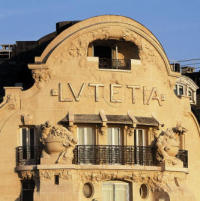
On April 14, 2014, the Hotel Lutetia closed for a three-year renovation. This article, written in early 2013, provides a “before” view of this historical hotel as its owners were seeking a new path to glory that eventually led to its closure for a major overhaul.
* * *
By the time the Hotel Lutetia opened its doors in 1910, well-to-do visitors to Paris were familiar with the extravagance of hotel luxury in the City of Light but they hadn’t yet experienced it on the Left Bank. Palatial lodging had until then been a Right Bank affair: Hotel du Louvre, the Meurice, the Ritz, Hotel Normandy and others flourished in the triangle between Place de la Concorde, the Opera and the Louvre, Paris’s primary luxury zone of the Belle Epoque.
Wealthy visitors, including British aristocrats and the like, flocked to that Right Bank zone where, without traveling far, they could call on fellow French aristocrats (who’d had the good sense to marry the wealthy heirs of banking and industry), visit the Louvre by day, attend the Garnier Opera by night, luxuriate in tea rooms, hotel bars, high-class prostitution, see the sights, check out the latest art, fashion and jewelry and shop. There was little reason to stay elsewhere.
The Left Bank also had its shopping attraction in the name of Au Bon Marché, a temple of modern commerce created by Aristide Boucicaut. In the 1860s Boucicaut had launched the concept of the department store—all you could want in a single place—in France and well beyond. The square between Le Bon Marché and the Lutetia would eventually be renamed Square Boucicaut.
The owners of Au Bon Marché (its name was eventually changed to Le Bon Marché by the LVMH group, which has owned the stores since 1984) therefore devised a plan to further cater to the needs and whims of the crème de la crème of shoppers while also attracting members of government (the houses of parliament and most government ministries are nearby) and notables associated with the universities in the Latin Quarter: they would built a hotel unrivaled on the Left Bank.
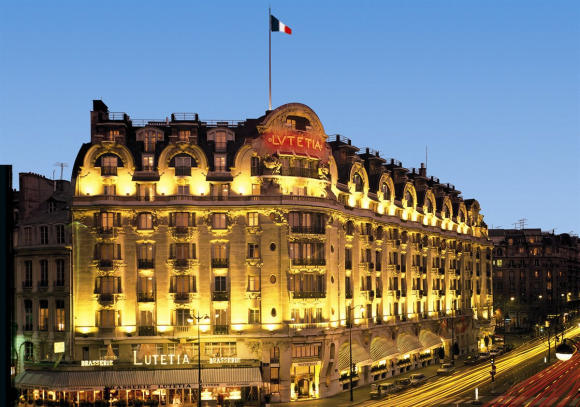
The hotel was given the grand name Lutetia, after the town developed along the Seine by the Romans after their conquest of the local tribe of Celtic Gauls known as the Parissi. The Lutetia’s architects were Louis Hippolyte Boileau and Henri Tauzin, who designed a building that was a precursor to the Art Deco style. Boileau’s grandfather was the initial architect of Au Bon Marché beginning in 1867, a project to build Paris’s first specifically designed department store that was taken over by Boileau’s father. Boileau himself worked on an expansion of the store in the 1920s.
Though the initial exuberance at the new hotel was stopped in its tracks by the First World War, the Lutetia took off with a bang during the Roaring ‘20s and assumed its role as a purveyor of the spirit of luxury on the Left Bank.
Lutetia’s construction, however, didn’t create a major wave of top-tier hotel construction on the dense central Left Bank. Instead, luxury pursued its evolution on the Right Bank as it extended its reach to the area surrounding the Champs-Elysées. The Hotel Plaza-Athenée which opened on avenue Montaigne in 1913, served as a cornerstone for the development of high-pampering hotels to either side of the Champs-Elysées, then well on its way to becoming a new sector for Paris extravagance.
One hundred years on, the Right Bank, specifically the first, eighth and sixteenth arrondissements, remains the natural herding ground for high luxury lodging and shopping and the preferred bank for department store shopping in Paris.
With 231 rooms, including 60 suites and junior suites, plus a large plush lounge-bar, a magnificent banquet room, meeting rooms, a brasserie and a gastronomic restaurant, the Lutetia’s size makes it an oddity on the central Left Bank. Perhaps because of that the Lutetia seemed to lose its way in the 1990s and early 2000s as boutique 4-stars claimed control of the hotelscape of the 6th arrondissement and edging into the 7th (Relais Christine, Aubusson, Pont Royal, Montalembert, Bel Ami, Villa d’Estrée, Relais Saint Germain, etc.), even if some of those boutiques are quite the store.
I remember going to the Lutetia to meet friends who were staying there in the late ’90s and finding its atmosphere slightly reminiscent of 1945, when the hotel served as a repatriation center for displaced persons and concentration camp survivors. Its dark days from 1940 to 1944 when the occupying German took it over as headquarters for their military intelligence services (Abwehr), however, were long gone. It was a decent place to stay, alright, but I had come to see the Lutetia as yet another Concorde hotel: fine but soulless, on the Left Bank but no longer imbued with the exuberant intellectual spirit of the Left Bank of the 20th century, a 4-star chain mentality in a pretty body. Le Bon Marché still offered fine department store shopping but entering the Lutetia was like going to the mall.
It’s time now to reconsider that point of view.
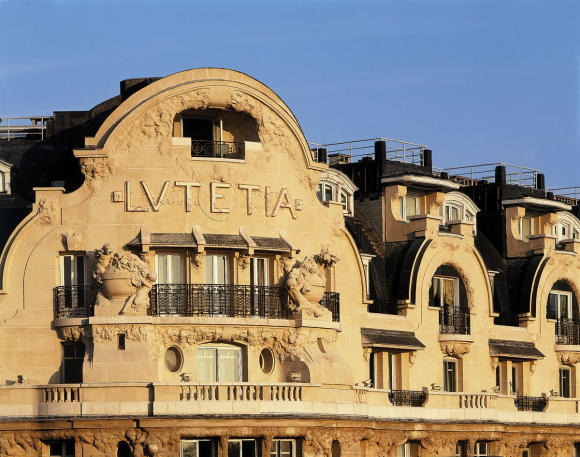
Since 2010 the Lutetia has been the property of the Israeli Alrov Group. Though still under Concorde management, the Lutetia is in the process of reclaiming its discreet yet showy side, a duality that a hotel must master in order to garner attention in the absence of a glowing article in The New York Times, a few glossy magazine spreads, a juicy sex scandal or Starwood points.
The Lutetia has a ways to go if its owners fantasize about joining the ranks of the “palaces,” as they top-tier hotels are known in France, yet the building was designed with as much luxury in mind as the famous names of the Right Bank, so the physical potential remains. Meanwhile, 5-star status mostly requires the will do so at this point. In any case, this is a property worth keeping an eye on.
As a business destination this been a sure bet all along at the right price. It has now been successful of late in enhancing its design, art, and literary cred, which has helped shake off its chain reputation, making it more appealing for free-spirited leisure travelers.
The Lutetia is a 4-star hotel, among the city’s finest in that category, especially for such a large hotel by Paris standards. But stars alone do not make a hotel; travelers should be wary of the star inflation over the past two years as France has harmonized its categories in line with other European countries. Five-stars are not always more prestigious than four.
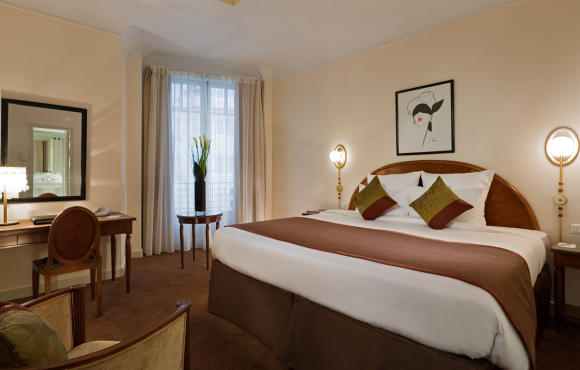
The Lutetia has more upgrading to do in terms of service and in some of the rooms in order to restore its wow power through and through. Nevertheless, many of the rooms are on fine footing and nearly all have have size in their favor, even the 7th floor rooms, originally reserved for chauffeurs and other personnel accompanying the fortuned clientele. And certain aspects of the Lutetia are clearly intended for a 5-star or even palace clientele. In particular, there are several drole or chic and in some cases spectacular designer suites that, along with works of art in the public spaces and the Art Deco spirit of the building, earns the Lutetia its designer cred.
The more eye-popping of those designer suites—signature suites, they’re called—are clearly intended for high-end travelers, e.g. the 1300-square-foot fifth-floor suite decorated by the sculptor Arman on the themes of music and African art; the Littéraire Suite with its own library; the shoe-themed suite with works by the artist Thierry Bisch; the filmmaker David Lynch has decorated a suite that is an ode to his adoration of Paris. The 7th-floor Hiquily Suite can only be thought of as the female nude suite since they appear everywhere: lamps, table bases, mirrors, etc.
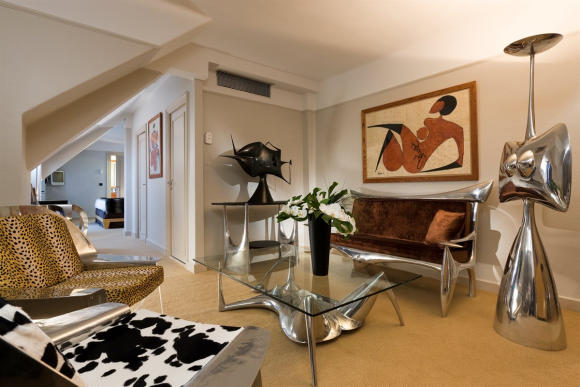
Museum-quality photography adorns the walls of several suites that have been decorated in collaboration with Paris’s Maison Européene de la Photographie. Some of the signature suites have stunning views out to the Eiffel Tower or over the center of the capital. These suites are generally beyond the budget of 4-star travelers and even many 5-star travelers. Yet the more self-assured 5-star travelers who generally look toward the Right Bank for luxury hotel options will not feel like their slumming by considering this Left Bank 4-star option.
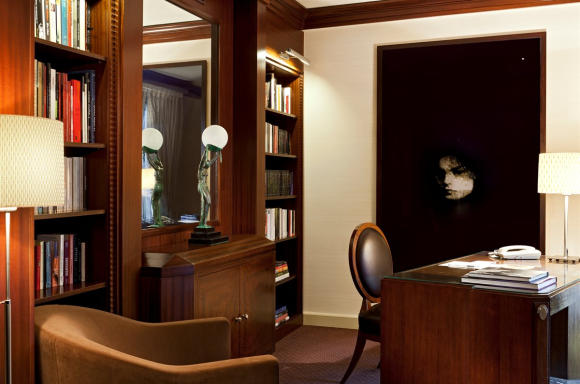
Space limitations on the central Left Bank ensure that smaller 3- to 5-star hotels are bound to dominate the hotelscape in the area. Nevertheless, it’s nice to see that the Lutetia is fighting for its reputation and doing a good job of ensuring a place where visitors can live large on the Left Bank.
For those staying in a 4- or 5-star hotel where boutique may be a code word for a lobby you don’t want to sit in and a receptionist who serves as bartender, it’s worth keeping the Lutetia in mind when in search for a somewhat sophisticated place for:
– a meal: Paris, a gastronomic restaurant (one Michelin star) cheffed by Philippe Renard and decorated by Sonia Rykiel, open Mon.-Fri.; Le Lutetia, a brasserie, open daily; a “jazzy brunch” served Sundays noon-2:30pm Sept-May;
– a literary event: among them, events held by the association Les Mots Parleurs, which organizes readings and literary encounters at the hotel one Saturday evening per month;
– a musical evening: in particular jazz in the lounge-bar Wednesday to Saturday evenings, 10pm to 1am, under the programming of in-house pianist Daniel Roca, and
– a drink at Le Bar du Lutetia. Did I mention that I have a cocktail named after me here? No? Well, continue to “Gary’s Cocktail at the Bar of the Hotel Lutetia” for a singular account of how that came about.
© 2013, Gary Lee Kraut
Hotel Lutetia. 45 boulevard Raspail, 6th arrondissement. Tel. 01 49 54 46 46. Metro Sèvres-Babylone. Small spa area. Stylish cigarette and cigar room by the bar. A monthly schedule of literary and jazz events and exhibitions at the Lutetia can be found here.
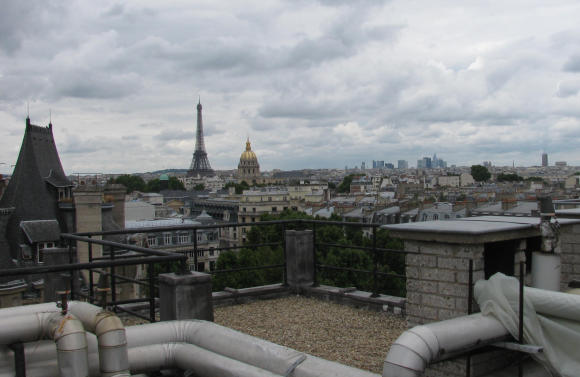


Hello Gary, this is a wonderful story of Lutetia before the recent renovation. I’m writing a column in August about the Lutetia’s origin story to Le Bon Marché, and I would like to reference your column, if I may? Thank you.
Hi Patsy. That article is indeed dated since it predates the latest renovation but do feel free to reference it. Best regards. Gary